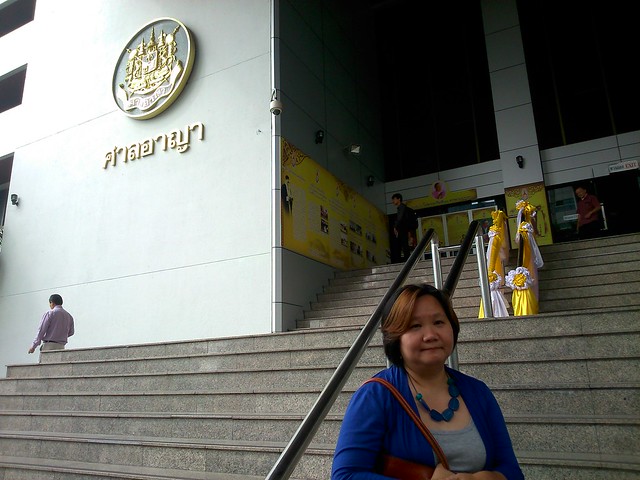The Supreme Court for the first time ruled on a case against an internet intermediary, finding the Prachatai Director guilty for failing to delete lèse majesté comments on the now-defunct Prachatai web forum.
At the Criminal Court on Ratchadaphisek Road, Bangkok, the Supreme Court on Wednesday morning, 23 December 2015, confirmed the earlier verdicts of the Court of Appeal and the Court of First Instance, sentencing Chiranuch Premchaiporn, Director of Prachatai, to eight months imprisonment and 20,000 baht fine with a jail term suspended for one year. The suspension period has been completed since 2013.
In the courtroom, an official from the European Union (EU) and delegates from the embassies of the US, Germany, Sweden, and France came to observe the verdict reading.
The Supreme Court convicted the Prachatai Director under Article 15 of the 2007 Computer Crime Act (CCA) for allowing an allegedly offensive comment about the monarchy to remain on the now defunct Prachatai webboard for 20 days.
She was arrested and briefly detained in March 2009 before the court granted her bail.
On 30 May 2012, the Court of First Instance sentenced her to one year in prison and a fine of 30,000 baht, but reduced the jail term to 8 months and the fine to 20,000 baht, citing her cooperation in the judicial process, and finally suspended the jail term for one year because ‘the defendant has never been convicted before and in order for the defendant to have the opportunity to become a good citizen of the country’.
The Court of Appeal in November 2013 upheld the verdict of the Court of First Instance.
The Supreme Court also gave an additional ruling that the Prachatai Director did not fully cooperate with the authorities in deleting illegal content, giving two reasons:
Firstly, the court said while “the Prachatai webboard operates 24 hours at the office” and when the defendant received a police summons indicating the URL of the problematic content on one Saturday at its office, the defendant deleted the content only on Monday. This showed that the defendant did not act to delete the content immediately, the Court said.
Chiranuch has testified that the person who received the police summons was not on the Prachatai staff, but the staff of another organization working in the same building. She insisted that she received the summons later on Monday and immediately deleted the content as indicated.
Secondly, the judge said Chiranuch was rather passive in providing useful information for the police’s investigation to find the webboard users who produced illegal content. The judge said Chiranuch did not provide computer traffic data of the webboard at first. Later when the police requested for such data, Chiranuch failed to give it because it had exceeded the 90 days period that web intermediary was required to collect the data.
Under Article 18 of the CCA, a service provider must store computer traffic data for at least 90 days. However, in special cases, the authorities can issue an order under Article 26 of the CCA to a service provider to store the data for longer than 90 days, but not exceeding one year.
Arthit Suriyawongkul, from Thai Netizen Network (TNN), a network of Internet users which works to promote internet freedom, told Prachatai that the police could have issued a request to Chiranuch to retain the traffic data beyond 90 days, but they did not do so.
“The police could issue an order for such computer data and could also issue another order under Article 26 for Prachatai to collect the data for longer than the 90 day period. However, the police failed to enforce those Articles. The court however blamed the intermediary for the police’s failure to do their duty,” said Arthit.
In brief, Article 15 of the Computer Crime Code states that any service provider intentionally supporting or consenting to an offence under Article 14 (importation of illegal computer content) within a computer system under their control shall be subjected to the same penalty as that imposed upon a person committing an offence under Article 14.
Article 14 lays out a jail term of up to five years or a 100,000 baht fine or both as penalty to importers of prohibited computer content, such as seditious, lèse majesté and defamatory content.
According to TNN, the enforcement of the CCA would result in depriving people of the right to freedom of expression, which is fundamental for democracy. Furthermore, this law contradicts the characteristics of the Internet in many aspects, thereby allowing abusive enforcement. However, the government has never recognized this or taken the issue seriously enough to amend this freedom-infringing law.
In addition, amidst the heightened political conflicts in the past three years, the CCA, especially its most problematic Articles 14 and 15, has been found to be used to attack political dissidents.
Internet expert Danny O’Brien, a defence witness in Chiranuch’s case, testified during the trial in 2012 that that in Europe web service providers are considered ‘intermediaries’ who cannot be held responsible as long as they are unaware of illegal content, and remove such content when prompted.
He added that in the US, intermediaries are also not held responsible if they remove illegal content upon notification, and are not required to monitor illegal activities in their network.

Chiranuch Premchaiporn, Prachatai Director, in front of the Criminal Court on Ratchadaphisek Road, Bangkok, on 23 December 2015
Prachatai English is an independent, non-profit news outlet committed to covering underreported issues in Thailand, especially about democratization and human rights, despite pressure from the authorities. Your support will ensure that we stay a professional media source and be able to meet the challenges and deliver in-depth reporting.
• Simple steps to support Prachatai English
1. Bank transfer to account “โครงการหนังสือพิมพ์อินเทอร์เน็ต ประชาไท” or “Prachatai Online Newspaper” 091-0-21689-4, Krungthai Bank
2. Or, Transfer money via Paypal, to e-mail address: [email protected], please leave a comment on the transaction as “For Prachatai English”
